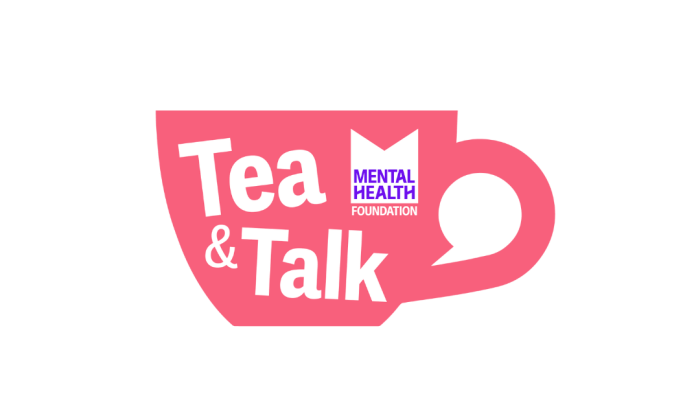World Mental Health Day is celebrated every year on 10 October. The day is about coming together to talk about mental health and show everyone that mental health matters. Talking about our mental health can help us cope better with life’s ups and downs.
So, on World Mental Health Day and beyond it, why not check in with your friends, family, peers, or colleagues?
The 2024 theme set by the World Federation of Mental Health was workplace mental health. The theme highlights the importance of addressing mental health and wellbeing in the workplace, for the benefit of people, organisations, and communities.

Tea and Talk
Thank you to everyone who held a Tea and Talk for World Mental Health Day! If you’re looking for a way to pay-in your donations, you can do this online.
Donate
More ways to get involved
There are lots of ways to take part in World Mental Health Day and beyond. You can plan a Tea and Talk for World Mental Health Day 2025. In fact, you can hold a Tea and Talk any time of year!
We campaign all year round for good mental health. You can find other ideas on how to get involved here.
Why not keep in touch by subscribing to our email newsletter, or by following us on Instagram, LinkedIn, X/Twitter or Facebook to help us raise awareness.
What is a mentally healthy workplace?
There are many things that contribute to a mentally healthy workplace, from providing staff training on mental health to tackling discrimination and bullying. Importantly, a mentally healthy workplace supports open conversations about mental health.
While talking about mental health in the workplace has become more common, many people still face stigma when it comes to severe mental health problems. This means there’s more work to be done to tackle mental health stigma in the workplace.
Read our tips and advice on supporting someone with their mental health at work.

Talking about mental health
Talking is good for your mental health. And talking about mental health is important. But starting a conversation isn’t always easy. Whether you’d like to talk to someone about how you’re feeling, or check-in with someone you care about, here are some tips that can help.
1. Choose someone you trust to talk to
This might be a friend, family member or a colleague. Or you might be more comfortable talking to someone you don’t know, for example, through a support helpline. It can help to do a pros and cons list about talking to someone.
2. Think about the best place to talk
It’s important to choose a place where you feel comfortable enough to open-up. You might want to choose somewhere private where you’re less likely to be disturbed. You also might want to talk while you do an activity, like walking together.
3. Prepare yourself for their reaction
Hopefully, you will have a good experience when you open-up to someone. But there’s a chance that they may not react in the way you hope. This may be for different reasons, like they may be worried or not fully understand at first. If that’s the case, try to give them time to process what you’ve told them. It might help to give them information to read to help them understand. And don’t forget to be kind to yourself and practise self-care.
1. Find a good space to talk without distractions
If you’re worried about someone, try to find a place where you know you can have a conversation without being distracted. Make sure to give them your full attention. It might help to switch off your phone.
2. Listen and ask questions
Listening can be one of the most valuable ways to be there for someone. Show them that you’re actively listening by facing them, making eye contact, and not interrupting. Questions can help you clarify what they mean and also show that you’re actively listening. But make sure the questions are relevant to what they’re saying, and not changing the subject.
3. Ask how you can help
Ask how you can help or make suggestions, rather than telling them what to do next. They might want support with making a GP appointment, help around the house, or just for you to keep things normal and chat about what’s going on in your life.
Get help
If you or someone you know is struggling with their mental health, you are not alone, and there are places you can go to get help.
Find help